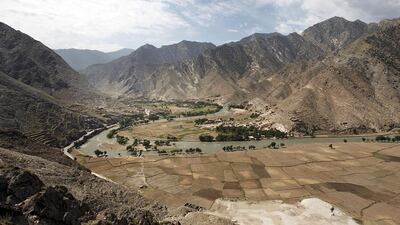ISIL is raising funds in Afghanistan by taxing locals who illegally traffic timber, say residents in eastern Kunar province where the militants operate their own "customs" office.
It comes after many of the hundreds of Taliban fighters in Kunar switched allegiance to ISIL.
The extremist group has been expanding its footprint in Afghanistan since Nato ended its combat mission in 2014. And although US president Donald Trump promised to "obliterate" ISIL when unveiling his new strategy for Afghanistan in August last year, locals in Kunar say the extremists' reach there only seems to be growing.
"Daesh has [opened] a customs office in the Mazar valley," provincial councillor Din Mohammad Pilot Sapi told The National.
“You know, under our administration, the smuggling of an inch wood is not allowed but in forest areas Daesh and the Taliban are in control and they allow this.”
____________
Read more:
Afghan forces to launch operation against ISIL in the north
ISIL in Afghanistan: French and Algerian fighters join militants' ranks
At least 11 dead as suicide bomber targets police in Kabul
____________
Impoverished Kunar residents have long chopped down oak and juniper trees in forested valley areas, selling the timber to businessmen and warlords as a source of income. But in 2016 the provincial government banned the sale of wood from Kunar over fears about deforestation.
Since then, residents have continued to chop down wood but must now smuggle the timber out of the province in order to sell it. The smugglers take routes that pass through territory held by militants to avoid being caught by the Kunar authorities, usually through mountainous areas. Most of these routes used to be controlled by the Taliban who similarly taxed the trade. But as these Taliban fighters began to switch their allegiance, the routes have increasingly been controlled by ISIL.
Since ISIL opened its Mazar valley "customs" office in Kunar's Sawkai district at the beginning of last year, smugglers operating in areas controlled by the extremists have been forced to take the following action: They drive the chopped wood to the base of mountains in the Mazar valley where it is then loaded onto mules. The smugglers then lead these mules through the mountains to ISIL's "customs" office where they must pay the militants 3,000 Pakistani rupees (Dh100) — the most commonly used currency in this part of Afghanistan — for each piece of oak measuring 8 feet by 1ft. Juniper, which is more difficult to sell than oak, is less popular with smugglers using the arduous and costly routes through ISIL territory.
In exchange for the tax, the extremists give the smugglers "customs" papers and send them on their way. The wood is then carried by hand to the Dara-Nur valley in Nangarhar where it is sold by the same men who chopped it down in the first place — for how much can vary from day to day and often depends on how far the smuggler had to travel.
ISIL is making good money from Kunar's illegal wood trade.
“In our area up to now, they (ISIL militants) have taken tax for 25,000 pieces of timber from locals, amounting to 3 million Afghanis (Dh158,708),” said Haji Nusrullah Safi, 40, an elder in Kunar's Pech valley.
It is not clear exactly how much tax the militants have collected in total at their Mazar valley office but the amount collected from Pech valley smugglers is likely just a tiny fraction.
____________
Read more:
Senior ISIL commanders killed in Afghanistan air strike
How Iran used religion, threats and money to sign Afghans up to Syria fight
____________
Kunar residents described to The National how ISIL, like the Taliban before it, has implemented a system of governance in areas under its control.
"The Islamic State fighters are very well organised. They rule according to their laws and orders," said Shiragha Hewad, 28, adding that all of the group's rules were the same as the Taliban's except one.
"Their bans on music, shaving of beards and smoking etc are all fine because they had already been imposed by the Taliban and people were used to it. Only their ban on the cultivation of poppies is a new rule, which might yet be challenged by residents.”
The Taliban banned poppy cultivation when it ruled Afghanistan between 1996 and 2001. But after being toppled by the US-led invasion the movement began taxing poppy farmers to find its insurgency and now appears to wield significant control over the country's heroin production line, according to an Agence France-Presse report published in September last year. In 2016, Afghanistan made around 4,800 tonnes of the drug, bringing in revenues of US$3 billion (Dh11bn), according to the United Nations.
More than half of Kunar's farmland is used for poppy cultivation.
Already, there has been some sign of friction between residents and the ISIL militants, who Mr Hewad said are themselves all locals.
“Two months ago they arrested two of our villagers who we then found dead in the Narang district a week ago. Both were young and well known Taliban, They were killed on charge of being spies to American,” Mr Hewad said.
An informal truce brokered by local elders currently stands between the Taliban and ISIL in Kunar. But residents fear that violence could escalate if this breaks down.
The main road connecting the Afghan capital, Kabul, with Pakistan runs through Kunar, which means further insecurity in the eastern province could have huge ramifications for the rest of the country.
Earlier this month, ISIL launched a major offensive on checkpoints belonging to security forces in Sawkai district. The militants were eventually pushed back though some families were displaced by the fighting displaced.
Mr Sapi, the provincial councillor, is optimistic that the security situation will improve, however.
"By the help of the nation, the situation will get better here," he said.

